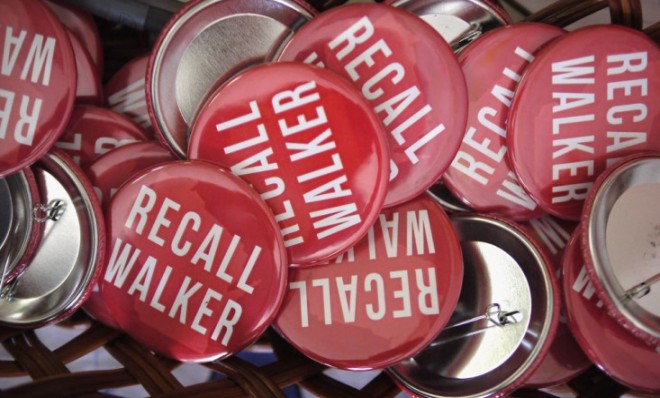Recall-mania: Why American voters are increasingly eager to oust lawmakers
Across the nation, a record 168 officials faced recall votes this year

A free daily email with the biggest news stories of the day – and the best features from TheWeek.com
You are now subscribed
Your newsletter sign-up was successful
While the multi-billion dollar presidential campaign sucked up most of the nation's attention this year, in scores of smaller elections across the country, voters took unprecedented action to force political changes of their own. In 2012, at least 168 elected officials faced recall votes. That appears to be an all-time record.
While Wisconsin Gov. Scott Walker's recall was by far the most prominent — it was only the third time a governor has ever faced a recall in U.S. history, and the first time one survived such a vote — there were plenty of other noteworthy attempts to bounce officials before their terms were up. The reasons for voter ire were quite varied, spanning the spectrum from taxes and government spending to gay rights to officials' malfeasance.
Outside of Wisconsin, the most prominent set of recalls in the country were of three councilmen in Fullerton, Calif. They were removed from office after a homeless man was allegedly beaten to death by police. Fullerton offers a stark illustration of one of the major reasons why the recall has grown so popular. If it wasn't for technology to help spread the message and the outrage, the Fullerton councilmen could probably have weathered the storm. Instead, their opponents organized online, where they could easily share video of the alleged incident of police brutality. Politically, this was incredibly effective.
The Week
Escape your echo chamber. Get the facts behind the news, plus analysis from multiple perspectives.

Sign up for The Week's Free Newsletters
From our morning news briefing to a weekly Good News Newsletter, get the best of The Week delivered directly to your inbox.
From our morning news briefing to a weekly Good News Newsletter, get the best of The Week delivered directly to your inbox.
The Wisconsin recalls were of the same vein. In the past, few would have cared about the goings-on in a state government. But thanks to 24-hour cable news, the internet, social media, and email, the Wisconsin labor battle and resulting gubernatorial recall became one of the biggest stories of 2011 and 2012. Union and business leaders felt the value of Wisconsin was so worthwhile that they spent a combined $125 million for the recall campaigns.
In 2011, 151 officials nationwide faced recalls. This year, it's 168. Why the continued growth? One reason is obvious: Recalls increasingly get results. Of the 168 recalls in 2012, 108 officials lost their seats (82 were kicked out by voters and another 26 resigned before the recall).
Of course, more recalls were attempted than actually made the ballot. On at least 508 occasions, citizens took out recall petitions in 2012. Most of them failed. Recalls against the governors of Michigan, Arizona, and Louisiana went nowhere, and the attempts to recall the mayors of Washington, D.C., Denver, Oakland, and Nashville all failed to get on the ballot. What's the difference between success and failure? Often, money. The Wisconsin recalls were fueled by heavy union support. The Fullerton recall made the ballot with donations from a local real estate developer.
By contrast, the scandal-scarred mayor of Washington, D.C., didn't face the voters, as no one put enough money into the pot to help get enough signatures. We saw the same problem in Oakland, where the mayor was criticized for the police response to Occupy Oakland, but not enough for opponents to raise the funds needed to launch a full-out signature-gathering effort. It's difficult and expensive to get signatures. In California, a Moreno school board member was indicted on 11 charges, including attempted murder, rape, pimping, and assault with a deadly weapon. Yet petitioners didn't get anywhere close to qualifying for a recall. They didn't have the cash to bankroll an effective signature-gathering effort.
A free daily email with the biggest news stories of the day – and the best features from TheWeek.com
Following the Walker recall campaign, there was talk of recalls facing a backlash. Pundits were quick to cite a Wisconsin exit poll that showed 60 percent of voters wanted to limit the use of the recall to malfeasance or incompetence. Another 10 percent of voters wanted to eliminate the recall altogether. However, all the talk around that poll had one major flaw: 70 percent of voters might have touted opposition to the use of the recall, but that didn't stop 47 percent of voters from casting ballots to kick Scott Walker out of office.
Elected officials hate the recall — many have proposed laws to limit or prevent its use. Michigan's legislature, which just approved a right-to-work law that enraged unions, has also just passed a law which could significantly limit recalls. But elected officials' anger is not shared by voters. On Election Day in November, we saw voters in four jurisdictions vote in four different states adopt a recall law in their city or town.
The recall is still a very controversial political weapon. But as 168 elected officials saw this year, voters are more than happy to use it. We can expect its use to continue to balloon in the future.
Joshua Spivak is a senior fellow at the Hugh L. Carey Institute for Government Reform at Wagner College. He writes the Recall Elections Blog.
Joshua Spivak is a senior fellow at the Hugh L. Carey Institute for Government Reform at Wagner College in New York, and writes The Recall Elections Blog.